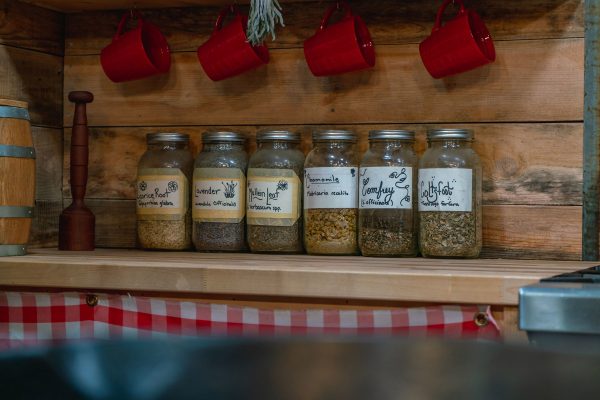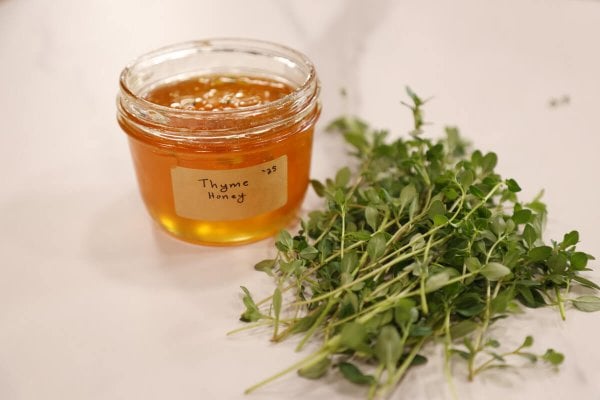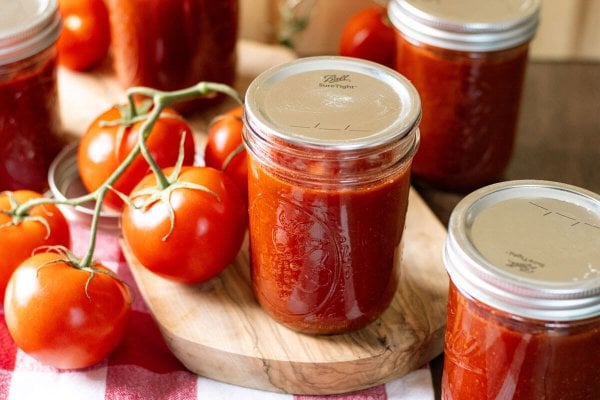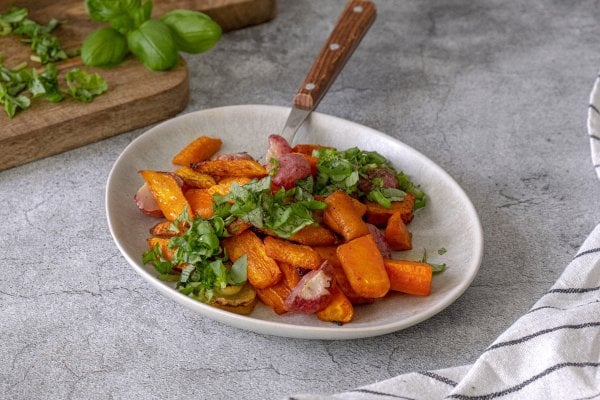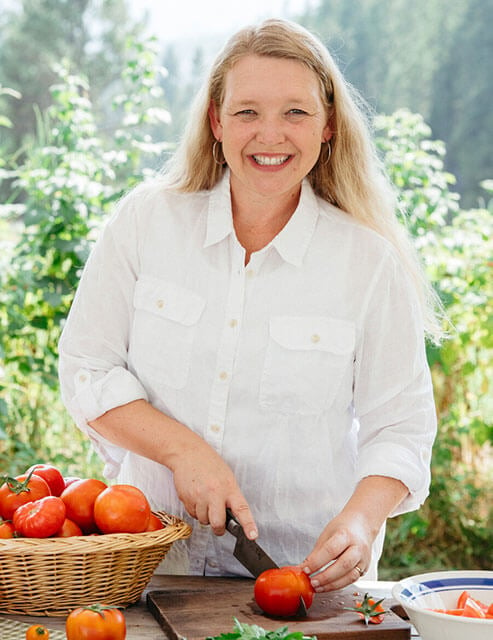Finding joy in something that can be mundane is a true character trait that’s to be highly valued. I’m excited to share our tips on finding joy in homemaking in this blog post and podcast.

Most of you know that we are a large family living a homeschooling and homesteading lifestyle, while also working out of our home full-time. Many people ask us, “How do you manage such a busy household?” “How do you get everything done?” And even, “How do you find so much joy in the everyday life?”
It’s not always easy, but when the proper systems and routines are put into place, it is simple.
Most of us forget that simple and easy aren’t the same thing. There are frequent bumps and difficulties during our days, so keeping the bigger purpose of why we’re doing what we’re doing in the forefront of our minds is key.
I’ve shared before about my secret to running a productive household. I’ve also shared the key to planning out your day and homeschool tips for beginners.
Today’s podcast is a continuation of one of our previous podcasts on shifting our mindset. This is one of those mindset challenges that people have in making the shift from a city/consumer lifestyle to a more home-based productive lifestyle.
Finding Joy in Homemaking
Finding joy in something that does get mundane is a true character trait that’s to be highly valued. When Donna Cluster from Creative Essential Mama contacted me about talking about finding joy in the home, I couldn’t say yes fast enough.
There’s no DIY tutorial out there on how to go about finding joy, but it’s something that we must cultivate in ourselves.
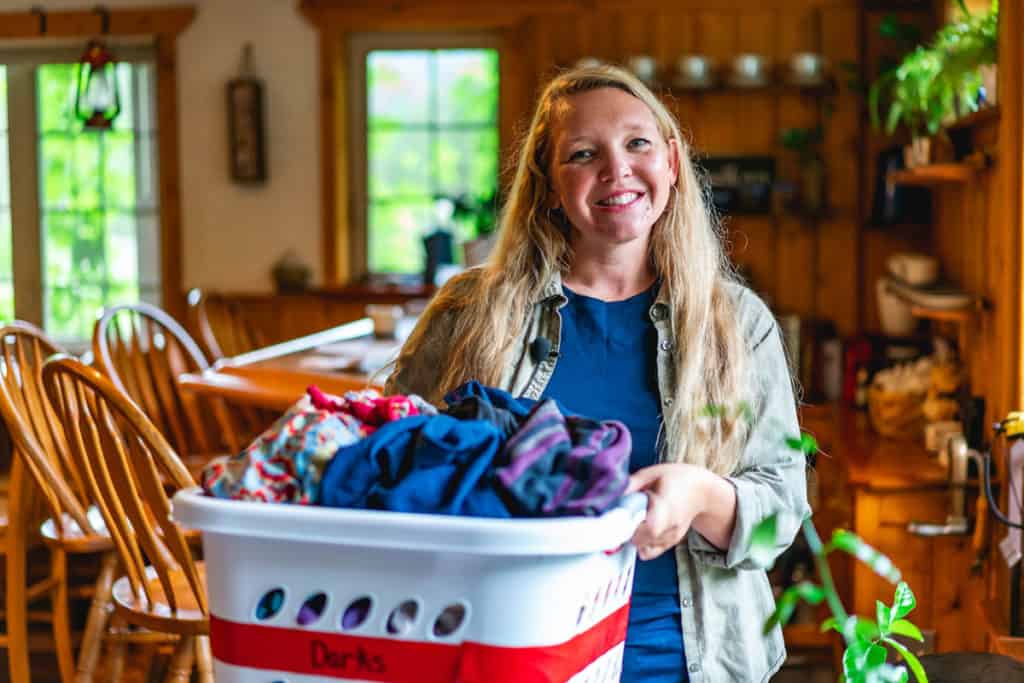
Faith and Your “Why”
Before one can find joy in homemaking, it’s essential for you to have a solid foundation in your faith and your why. For us, having faith in Jesus Christ and having security in that is the under-girding to everything and finding lasting joy no matter what we go through.
Beyond that, knowing your “why” behind choosing to be a homemaker is important. Especially on those days when you don’t emotionally feel joy or gratitude, this will keep you going.
Fear is never a good motivator. In fact, fear and joy usually don’t go hand in hand. So it’s important not to jump into homesteading or homemaking because of fear of what’s going on in the world.
There’s a difference between recognizing what’s going on in the world and making a well-thought-out plan to change your family’s influences and just jumping in with both feet out of fear.
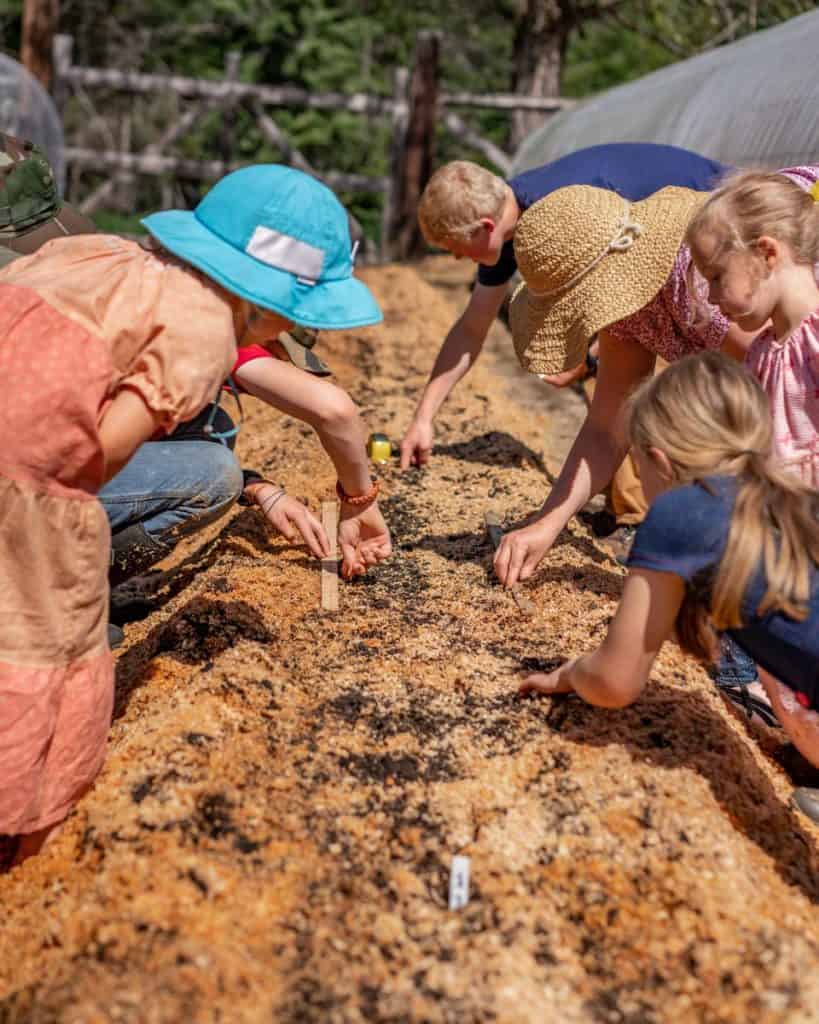
Building Character
Finding joy in homemaking is all about developing character. It flies in the face of so many things our current culture is telling us is “normal.”
Finding joy in homemaking is about:
- Giving instead of receiving.
- Serving instead of being served or idolized.
- Labor instead of rest.
- Long-term benefits rather than immediate benefits.
Culture is telling us that we should get rest, have time to play, experience “fun” and enjoyment, get paid, be idolized, etc. It’s so hard to break out of that very intense programming.
The following are a few things we can begin practicing in our daily lives to help break that programming…
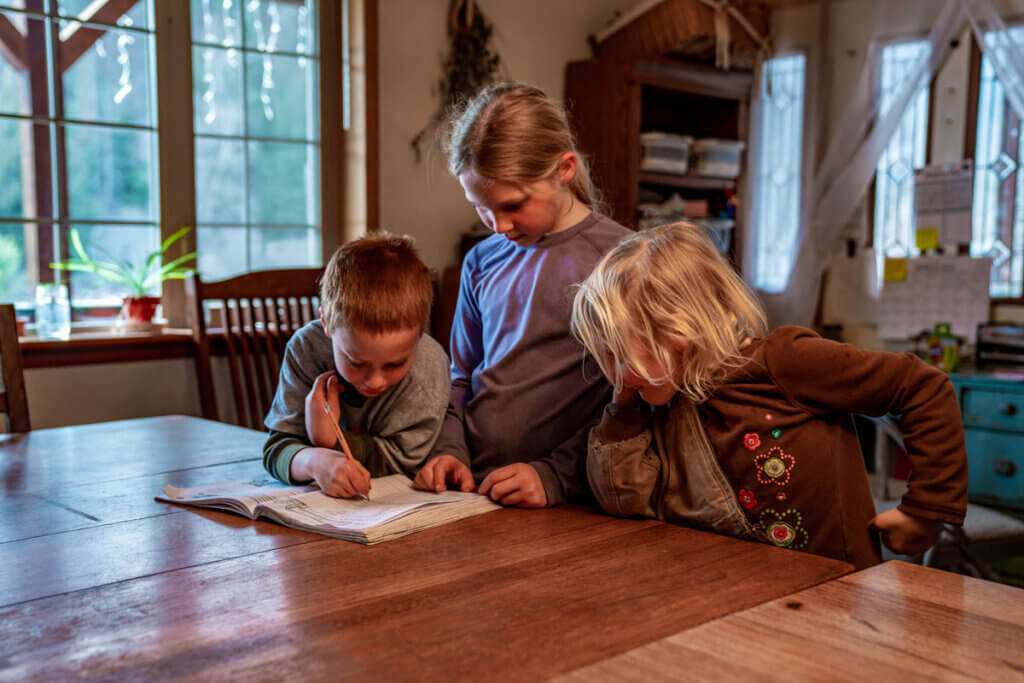
Value Serving
This is extremely hard to do. Our default is to take care of #1 (me). The message we’re constantly served is that we should be taken care of, and if we don’t get it, we’re often unhappy (or idolizing someone else’s life who looks like they’re getting everything they want).
In our house, we have a saying. J-O-Y: Jesus first, Others second, and you last. If we get this backward, we’re “YOJ-ing” out and that doesn’t make anyone happy.

Take Your Job Seriously (Yes, it IS a Job)
A homemaker wears many hats. Chef, nutritionist, education specialist, child psychologist, life counselor, community assistant, medical advisor, herbalist, farmer and chief decorator. Sometimes I hesitate even listing out all the hats a homemaker wears because it’s an excuse to give ourselves a pat on the back.
This isn’t my intended purpose when sharing all the jobs we hold. Instead, it’s my encouragement to you to not be passive about your homemaking. Take your job seriously and learn how to do it better. Gain the skills needed to streamline tasks.
Maybe you can look into taking a class to learn more. This is a real passion of mine and the reason why I offer so many online courses to help educate homemakers.
- Herbal Medicine Cabinet: Colds & Flu
- The Art of Homemade Bread
- The Abundant Pantry: Canning
- Fearless Fermenting Workshop
- Household Management Class
Whatever it is you do, look at how you can increase your skillsets to do your job even better.

Finding Gratitude and the Beautiful in Life
Taking time to recognize the beautiful parts of daily life is important. I think this is something that’s been lost as our lives have gotten busier and fuller.
Find the beautiful in the mundane and take the time to be grateful for it. Whether it’s the sunshine, the birdsong, or even a child playing. Take notice.
Finding Like-Minded Peers
Please don’t dump all your old friends. However, if those friends aren’t encouraging you or even sharing in your new passions, consider finding some like-minded people who will.
Encouragement and someone to spur you on in your endeavors will dramatically help. If you can’t find anyone locally, there are some awesome online communities such as our Homestead Kitchen Membership.

Ask for Encouragement
This can be hard and a thankless job. Sometimes we need to reach out to our spouse or friends and let them know we’re feeling discouraged and could use some encouragement.
I hope these tips have been helpful and that you can now take these steps and use them as tools in your own life to bring a little bit more joy.
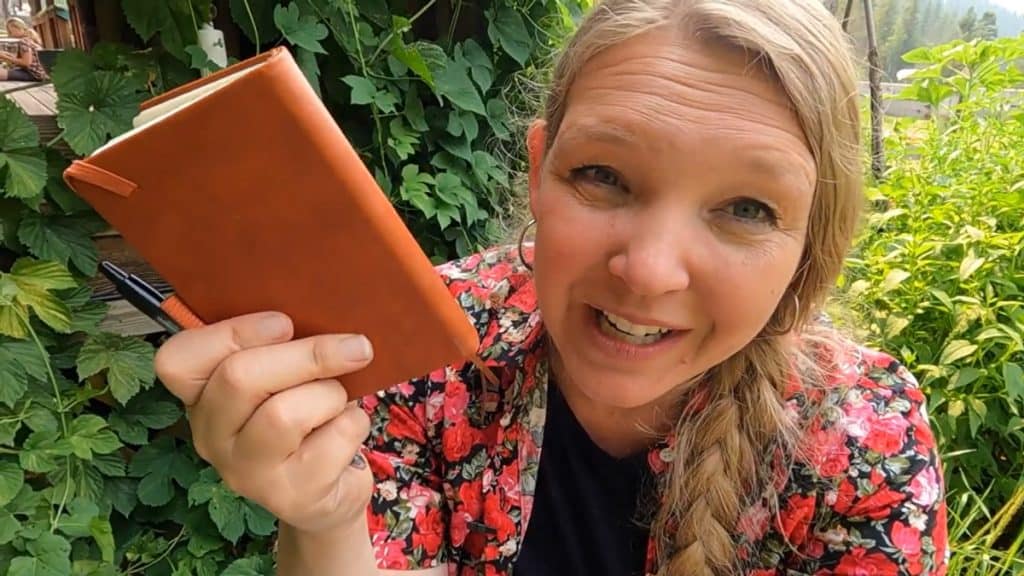
Household Management Masterclass
If you feel like you want to take your household management skills to the next level, consider joining my Household Management Class. In this masterclass, you’ll learn how to turn your household chaos into household peace. It includes 17 full video lessons, my make-ahead breakfast casserole recipe eBook, and my household planning sheet printables. I’ll see you in class!
Other Posts You May Enjoy
- Plain Values Magazine & Room to Bloom
- Chore Jurisdictions
- Educating Children Through Homesteading
- My Secret To Running a Productive Household
- Prepping Your Pantry For Preserving Season
- 7 Staples To Always Have
- Yearly Planning on the Homestead
- The Family Economy
Josh: Hey, you guys. This is Josh.
Carolyn: I'm Carolyn.
Josh: With Homesteading Family, and welcome to this week's episode of the Pantry Chat: Food for Thoughts.
Carolyn: This week, we are tackling an interesting topic, which is finding joy in homemaking. But we're actually going to be talking about it from a little bit of a different angle because we're going to be discussing finding joy in a home-centered life, because they have the same problems attached to them, the same challenges. So, we're going to be talking about how to find joy in your home-centered life.
Josh: Well, I think there's a lot there that's just about finding joy in life. There's a lot of foundational pieces. I mean, for us, it's definitely centered in that home-centered life, but it's really foundational to just finding joy in life.
Carolyn: It really is. Yeah. I think it applies to just about everything, because everything has some degree of drudgery to it. But the thing is, when you aren't out and you aren't distracted all the time, you have to face yourself a little bit more, right? You have to actually deal with yourself, and you have to deal with your discontent if you're not running out the door all the time, and being entertained everywhere, and doing all the things that is kind of normal to do in everyday culture. So, finding joy, just period, is kind of counter-cultural. Finding it at home when you have a lot of down and quiet time, it really helps you to perfect that art, or at least to make it better, right?
Josh: Yeah. You also have to deal with people in a different way. If you're home and it's a home-centered life, this homesteading life, you're often homeschooling, sometimes you're working from home, and so your relationships change. And that can be challenging from the everyday... What a lot of people experience is normal, as people are coming and going and they relate on a different level. And so, this is going to be a good discussion, but we're going to catch up a little and a little chit-chat. And for those of you watching, we're next to each other, but we're not. Figure that one out for those of you that are listening.
Carolyn: Yeah. Yeah. We're actually in two different locations here today. I miss having you sitting right here, have a cup coffee.
Josh: I know. Me too.
Carolyn: That's always a fun moment, but...
Josh: I'm in the office today and have some prep. This will be old news by the time this comes out, but prepping for the Traditional Skills Summit, so having to work early from the office today. So, we are apart, but together.
Carolyn: Yeah. Well, you're not too far away. At least, you'll be... I saw you this morning, I'll see you this evening. So, that's a good thing. But what have you been up to?
Josh: What have I been up to? Well, I'm late in cleaning out the deep bedding this year in the barn. So, that's been my main chore this morning, besides just kind of overseeing the general flow outside. But my main job is getting that out of the barn, and piled, and mixed, and composted, ready for pasture, either this fall or in the spring. We'll see when we get to it. That's been one of my larger projects. Of course, we're working on a barn addition and running out of daylight hours, to kind of have a better setup this winter as we're just slowly making improvements on our deep bedding system and housing our cows, which... We don't have a lot of cows, but they nearly doubled this year, so we've just-
Carolyn: Reproducing assets. It's nice when they double themselves.
Josh: Reproducing assets. You could say, that's probably in 80, 90% return on investment this year. That's pretty good, as far as investing goes. Very good. But we do and knew we had to keep doing some things on the barn, so this is going to, hopefully, be the final addition to the barn and have some long-term permanent setups in place. So, a lot of what I'm up to is around getting that done and ready. It's September and weather's cooling off, and starting to feel the pressure that winter is not that far away.
Carolyn: Yeah, definitely.
Josh: What about you? I think the harvest is just trickling in.
Carolyn: I don't know that trickle is the right word. I think it's now gushing in. Every day, there's big boxes and baskets and stuff coming in, that are filled with things that need to find their way into dinner or into the pantry. So, there's a lot of just dealing with the harvest, at the moment, which is exciting. It's these challenging moments of like, all year, you dream of these fine, fresh tomatoes, and then you get them. And in north Idaho, you get them all in a couple of week period, and then that's it. That's what you've got.
And so, it feels like a race against the clock every day, to keep up with the produce and make the most use of it and the best use of it, and not to let things go to waste, because once it's done, it's done, and we're approaching that moment really quickly, most likely. Although, last year, we didn't have a frost till mid-October. So, you never know. But usually, we're not far from kind of starting to wrap up the garden here.
Josh: Right.
Carolyn: Yeah. I've really been taking care of that. The other exciting thing that is going on around here... Well, a couple of them, is the milk. Not only do we now have the milk cow, but we have the milk goats. And so, it's really interesting. What this has done in the house is it's forcing other people to learn how to make cheese and butter, because one person just can't keep up with the amount of cheese making that needs to happen or even the butter making that needs to happen, in order to keep up with this amount of milk that's coming in. And so, now, we've got one of the younger girls, Abigail, is doing a lot of butter and cheese making. In fact, this morning, she's making paneer, from all the rest of the goat's milk.
Josh: So good. That cheese is so, so good.
Carolyn: And it's a very well-timed because we're not quite at butchering yet, and we're very low on meat, and the paneer just kind acts like almost... Well, it's another protein source because you can put it in your stir fries for dinner. So, it's a little different than the way cheese often works because it doesn't melt.
Anyways, we're kind of having fun and it's helping us to reach out into the next children, as far as training up cheese making. Our intern is getting a crash course and she's making... Right now, she's getting strong arms from stirring curds, a lot of curds, a lot of days out of the week, and I think she's loving that. So, it's a lot of fun, lots of interesting things going on.
And then, the other thing that's really exciting is... I don't think we've shared this publicly, yet, but we've just signed contract for writing a freeze drying book.
Josh: Oh, I thought you're going to say something else, but that is great.
Carolyn: Yeah. Yeah. Yup. So, we've got that going on in the background. I'm doing a lot of extra playing with the freeze dryers, and testing things, and trying things, and dialing that in. And so, this, of course, is the perfect season for that, being that we've got a lot of produce coming in. So, this is very exciting, to be writing my first published book. That's pretty cool.
Josh: Yeah. You guys, this is going to be, especially those of you that take our classes and know Carolyn's teaching, this book is going to be amazing. When it comes to freeze drying preservation, Carolyn just does her diligence, does her research, and this is a really exciting project that we get to work on. Yup.
Carolyn: It's going to be fun. Just like a to-do classes, I'm writing the book that I wish that I could have, sitting there, when I'm freeze drying. All the information that I needed to start and all the information I still need to keep processing food, day after day. So, I'm very excited about it.
Josh: Yeah. This is not freeze drying candy. I mean, I don't know if you're going to include some of that, but it seems like most of the freeze dryer books, it's like, "Let's freeze dry candy." Well, that's a great project, but that doesn't help us, those of us that are seriously putting up food and preserving the harvest, whether it's our own or from the farmer's market and... Yeah, this is going to go there.
Well, I want to add one thing, because what I thought you were going to say was, it revolves around our dinner out last night. And exciting little bit of news, that our first and oldest is getting married.
Carolyn: Yay.
Josh: Yay. So, that is exciting news for us. That's new territory, and we're very excited for the both of them. We've been up to that and a lot of thoughts around that, and planning, and... I had dinner with two of them last night. Just really exciting. Big life changes, new stage in life for us.
Carolyn: Yeah. We feel so good about this particular engagement and marriage. It just is encouraging and it's exciting.
Josh: Wonderful to say that. Yup.
Alrighty. Well, we better continue covering some ground here. We'll get to a question of the day from Because B. I don't know. Becca Sue, there we go. I got it. Becca Sue. I just read how your eyes do that. They just go and they see something. Becca Sue 2067 says, "On better than candy, that is how to freeze-dried berries which, indeed, kids trade our kids their candy for our freeze-dried fruit. It's better than candy."
So, Becca Sue asked, "Could you give me a little more information if you have done green beans in the freeze dryer? I've watched a few videos, they seem to be great snacks, right from the jar. However, it seems to be more work to rehydrate for meals. Do you have any experience with this? I currently pressure can our green beans."
Carolyn: Yes, I have freeze-dried a lot of green beans. Last year, we pretty much did all of the green beans in the freeze dryer, and we had a lot of them.
There are three different ways you can prepare green beans to go into your freeze dryer, and you end up with different products on the other side. My favorite way to do them is just to snap them and stick them in. Don't do anything else because there's a few other buckets of produce that need to get dealt within the kitchen, at the moment. And so, just get it done, get it over with.
What this ends up giving you is raw green beans that take a little bit longer to rehydrate. It's not work, it's not a problem, you just have to give it more like one to two hours to rehydrate at room temperature when you want to rehydrate it.
If you want faster rehydration, you blanch the green beans before you freeze dry them. So, you can just blanch them in water, a couple of minutes in boiling water, stick them in cold water, dry them the best you can, drain them off, and then put them in your freeze dryer that way. And that's going to give you a quick rehydrating green bean. Quick meaning, within, probably, 10, 15 minutes, you're going to rehydrate.
The other thing that you can do is to fully cook the green beans and season them, and then freeze dry them like that. I don't know if I've just said dehydrate multiple times, but just to not confuse everybody, I'm only talking about freeze drying right now. And that, again, gives you a very different product because you end up with cooked green beans, instead of raw green beans. And so, those rehydrate pretty quickly, but usually you have to be a little bit more careful with the rehydration, just to make sure you don't get too much water in there. So, you have to add the water slowly or have correct ratios, which is kind of a scientific equation of measuring, weighing your food when it goes in fresh, in the trays, and when it comes out, finished, and knowing exactly how much water to put back in.
Those are the green beans that people eat as snacks, or the ones that are precooked. You can just eat them as freeze-dried, and they're delicious. You can eat any of them, they're just not as good as if they've been cooked, and then freeze-dried, and then you eat them... I haven't figured out the term. It's un-rehydrated. What is that term, in its freeze-dried state? There feels like there should be a word there, and I have not found that word, yet, but-
Josh: You better coin one for the book.
Carolyn: Yeah, there we go.
Josh: Yeah, un-rehydrated. So, you're talking about the cooked green beans if you're going to eat them non-rehydrated as a... I mean, cold, it's room temperature, whatever, but as a snack, cooked is the best way to go.
Carolyn: That's going to give you the best-
Josh: Yeah, but not necessarily... Depending on how you want to use the green beans, even after you rehydrate them. So, you gave three ways, but as far as using them, post-rehydration, what is your favorite way or what's the reasoning for doing it the different ways? The rehydration timing.
Carolyn: My favorite way is to snap them and put them in non-blanched, into the freeze dryer. And one, I feel like that is, as far as time savings and energy savings, my energy savings, that's the easiest efficiency, because there's no extra work getting it into the freeze dryer, and then when you take it out of your jars, it's been in storage and you decide you want to have green beans to go with dinner, you just put them in cold water or cool water on your counter. You just have to do it a couple of hours ahead of time and let it just sit, and then they're ready to go at dinnertime to get sauteed or steamed or whatever it is you want to do with them, to get them-
Josh: That is normal.
Carolyn: Yeah. That's my favorite.
Josh: On the other end, when you precook them, you can probably rehydrate them with boiling the water the way you rehydrate, say, I got to do some backpacking and hunting and I rehydrate stuff, just you pour boiling water and let it sit, it's ready to eat.
So, presumably, I'm making the presumption here that, with the cooked green beans, you're putting more work up front, but you could just add hot water, theoretically, and have that ready for the meal. So, shorter prep time, at meal time, kind of that ready to go type of thing.
Carolyn: Right. And you can have all your seasonings in it, you can have some onions and garlic cooked in there with it and all of that. You just want to not cook it in a high amount of fat because the fat doesn't freeze dry well, and it'll cause your green beans to go rancid, so you want to do a low fat preparation on that. And then, when you rehydrate it, like you said, you just use a very hot or boiling water, pour it over, let it sit, and you've got a ready-made side dish.
Josh: That's great. Those are some good options for going a couple of different directions, and it all works well, depending on what you want.
Carolyn: Right. Yeah. All good choices. Lots of good choices with freeze drying.
Josh: Cool. All right. So, getting on to a topic, finding joy in homemaking, particularly. That is our subject line for the day.
Carolyn: I think as continuing on the discussion from one of our last pantry chats where we were talking about mindset, this is one of those mindset challenges that people really have. And in making the shift from maybe a city consumer life to a more home-based productive life, is finding joy in doing something that does get mundane and it's not always... You don't always get a lot of thanks for it. You have to be very internally motivated in order to really live out, finding joy.
And so, as I'm thinking about mindset and the mindset shifts that we need to make in order to be successful homesteaders... When Donna Cluster from Creative Essential Mama asked me to do a collaboration on finding joy and homemaking, I was just like, "Oh, yeah, that's going to fit right into the discussion, because I think this is just essential. This is something we really struggle with. There's not really a DIY how to do it tutorial out there, it's just something we need to start being aware of and start cultivating in ourself."
And again, like we said, back at the beginning, it's kind of choosing to find joy in life, right? Choosing to find joy in intentional living, and in choosing to find joy in living in a counter-cultural way, which goes against the grain. And that's hard to do.
Josh: Yeah, it really is. I'd love to lay a little foundation. We're going to talk about a lot of practical steps that help people in thought process mindset, but I think there's a couple of foundational pieces that are really important to that. And the first one is your faith and being rooted in your faith, and that's the long, big picture because if you're not grounded in your faith and where you're at, the other one is the why, why you're doing what you're doing, why the way you're living, which just kind of leads into that intentionality that you're talking about. But both of those are that foundation that carry you through, and undergird the day-to-day and the strategy and the practical things that you do. And for us, faith in Jesus Christ, knowing... Just being secure in our faith and how we live and what we do, it is the undergirding to everything to produce lasting joy through whatever we go through.
Carolyn: Yeah, absolutely. I think it would be hard to find joy in just about anything, especially nowadays. There is so much upheaval, so much challenge, so much insecurity in a lot of ways that, I think, to find joy in anything right now, would be challenging to do without a solidly rooted faith.
Josh: Yeah. Yeah. And right behind that is you just leaned into intentionality or the why, knowing why you're doing what you're doing. If you're choosing to live this homemaking life, this homesteading life, you get lost in all the just doing, and you've got to be rooted in the why and keep the why before you. That's what motivates you, that's what keeps you going. And we have a lot of deep reasons in what we're doing. And so, I think keeping that why in front of you and being able to refer back to that, not just yourself, but with your spouse, with your kids, your family members, whoever your community is being able to talk about and remember why. It's going to undergird, I think, a lot of the practicalities and the things that we're going to talk about here in a few minutes. To me, that's really important. I have to come back to those things regularly, and probably don't remember too enough.
Carolyn: Yeah, it's really important to hold onto. And the more you can be in line with the rest of your family on that, the more oomph that that why even has, because you can help each other to remind each other while you're doing that. Some of you guys who are out there, and there's maybe only one of you who is motivated to be doing this, maybe a spouse isn't or your family isn't or you're single, or whatever the situation is, finding other people that are like-minded, that can help remind you of your why when things get hard, is really important. Just having like-minded community is always so important, especially when you're doing something that is so counter-cultural, and walking so opposite what the whole rest of the world says you should be doing right now.
But I think this is an important place to bring out something that's really near and dear for Josh and I, as far as a principle that we like to talk about a lot is that, fear and joy are not... They're not compatible.
Josh: Yeah, they're not good roommates.
Carolyn: They really are. If your motivation is fear of what's happening in the world, you're going to have a really, really hard time finding joy in what you're doing, either on the homestead or at home or any location. But I do want to call out the difference between seeing a problem and seeing that the world's kind of a mess, and responding to it in a measured way, not out of fear. That is not fear-based. In fact, it's absolute foolishness to say, "Hey, the world's falling apart and I'm just going to ignore it and keep going like nothing's happening." That would just be considered foolish. And that's what a lot of people are doing. It's hard to handle the reality that the world's a mess, and so they just close their eyes and keep going.
So, it's not fear-based to say, "Things aren't going so well, I think I need to take some action." But if you're taking that action out of a direct fear and you're scared, you need to deal with that first. And again, that's where we come back to faith. You just have to lean back in that, because that is going to hinder joy in homemaking, homesteading, life, living, relationships, anything, if it's coming out of fear.
Josh: I like to look at fear like one of the senses, like touch. When you touch something hot, you go, "Oh, wow, man, that's hot. I didn't realize that was hot. That's a problem. I need to know." Avoid it, deal with it, whatever it is. And I think that's where fear is. When we see the things in the world that we're afraid of or we're worried about, we're putting this label fear on it. It's appropriate and proper, like you're saying, to identify that and to go, "Whoa, I see a problem here. I want to do something about it." But then, to move on and say, "Okay, let's find the solution." So, let's move forward, not walk in fear, but use that as that awareness tool, just like our senses are, that help us to see danger, see a problem, and then take appropriate action. You don't stand there and stay afraid of the fire or the pot, you just take the actions you need to take to control or mitigate the situation, and put the fire out or keep a distance from it or grab a mitt to hold the pot, whatever it is.
And so, I think it's the same thing here. Fear gets us aware, it helps us see the danger, know what we need to deal with. Okay, how do we now move forward? Work with the situation and respond to it appropriately, which obviously, is a lot more complex than dealing with fire. But if you can see it that way, we can see fear healthfully, let it get our attention, and then go, "Okay, let's figure out a plan." How are we going to live? How are we going to respond to what's happening around us?
Carolyn: Yeah, absolutely. I think that's a great way of putting it. Don't stay afraid of the pot. I like that.
Josh: Just have a plan.
Carolyn: Have a plan.
Josh: Your notes here say that, to kind of keep us moving and get into some of the practicality, I think, of this... Finding joy in homemaking is all about developing character.
Carolyn: Yeah, it really is. And again, I really want to point out that, finding joy in anything. But particularly, finding joy in something like homemaking or homesteading is so counter-cultural. And this is really important to note because all of the programming that's out there, you get onto Facebook, you get onto Instagram, you watch TV, you do whatever people do. We don't have TV, so I don't even know what's on TV anymore. But it all says, "You need to go, go, go, go, go. You need to live big, glitzy. You should be traveling all over the world. You should be advancing your career. You should be doing all these things." And it's all about this kind of instant gratification. It's all about receiving what you get. A lot of times, for women, it's all about maybe being kind of idolized up on the stage and, "Oh, isn't she so perfect?"
There's all these messages out there that we're receiving constantly. So, to intentionally kind of turn our back on that and say, "Actually, I'm going to live a life that's all about serving, and giving, and delayed gratification, and helping relationships form and..." All of these different things that really come with a home-centered life and the choices that a lot of people are making right now, it's not just hard, it is like swimming upstream. There is a current pushing against you, saying, "Turn around, turn around, turn around" all the time.
And so, not only do you have to be aware you're doing something hard, you are going to get fought the entire way, step-by-step. And I really want to pull that out because you can't successfully find joy in something like home-centered living, homemaking, homesteading, unless you are developing the character within yourself that kind of... I mean, I don't want to say outperforms. I don't know what the right word is. It's bigger than all of that cultural influence that's coming at you, over and over again, and that you, just like the rest of us, have all been programmed with since you were very little.
I remember, when I made the switch to staying home, I'd been going to college, I had a job, was working. And when we made the decision that I was going to stay home, be a homemaker, those first weeks were so hard because it was so quiet. I was at home, there was nobody giving me any accolades. It was a very different scenario than being out, and even going shopping all the time, and running errands and all of this. All of a sudden, I was at home. And I had to really face myself. And it is a challenge and it's a real challenge that people face. And it's a real struggle.
Yeah. I have a couple of steps that have really helped me, and I hope that they'll help you guys as well. Do you want to dive into those?
Josh: Yeah, sure.
Carolyn: Step number one in this is really placing a high value on serving. And that's hard to do in this culture, isn't it?
Josh: Well, that's hard for humanity. Our default is me, and that's what's natural. In the Christian life, we'd say, "It's wrong" or "It's not what we do", but it's just the reality of who we are. Whatever your beliefs are, our default is all about me, and the culture fully supports that, that we live in today. But that's-
Carolyn: Yeah.
Josh: ... very challenging.
Carolyn: Well, and it really supports the opposite like, it's not even just about me, I just don't want to serve somebody else, it's about you should be being served, is really the message that we're getting. Somebody should be taking care of you. And you see a lot of you deserve statements out there like, "You deserve time off. You deserve this. You deserve that." And you have to be very careful about that because, sure, those things are healthy for us. Vacations are healthy, at the right time, taking time off, doing the things that we-
Josh: We recognized for what you're contributing, what you're doing, that we need those things.
Carolyn: We do. And yet, when those become the focus, instead of your contribution, what you can serve, you are not going to find joy in anything, really, because that expectation will never be fully met.
In our house, we have a saying... I know we've talked about this before, of joy is Jesus, J, others, and then yourself, Y, J-O-Y. And Jesus first. And then, we have the joke saying that, "If you're putting yourself first, you've flopped it. And so, now, you're yoging out."
Josh: You're yoging out.
Carolyn: That makes everybody unhappy. You're instantly unhappy.
Josh: Yeah, there's no joy, there's no peace. As much as it's our default to serve ourselves and to serve our pleasures, that does not lead to a life of joy. It may appear so, and we may be able to cover up a lot, but it really does not lead to joy. Taking the job seriously. It's a serious job.
Carolyn: A serious job. This is really important. I have kind of a list of, if you're homemaking, from maybe a woman at home's point of view, it's a serious job. And I hesitate to even give a list of all the things that you're doing because that's so often used as this moment to pat ourselves on the back like, "Yeah, yeah, we're doing a good job. We don't need to work any harder. Look at how hard my job is", which is true. Not to take away from that. But we also need to take our job seriously. You're probably the head chef, if you're staying at home. You're probably the nutritionist for your home, the education specialist, the child psychologist, the life counselor. I mean, the list just goes on and on. Herbalist, farmer, all the different things that you can be. Definitely, chief decorator.
So, yes, good job that you're being those things, but are you taking them seriously as a job? Are you diving in, and learning more about it, and figuring out how you can be a better chef, how you can be a better household manager? Stagnation is never a place to feel good about, and I don't think any of us ever feel good about that, when you just stagnate in your job. It just makes the mundane even more mundane, right? Because it makes everything feel mundane.
So, the actual step is recognizing, this is a serious job. How can I take this seriously? How can I do a better job? How can I learn more and advance my career as a home educator, a homesteader, a homemaker? Whatever it is. And how do you get prepared for the day? Like, you're getting prepared for a job. Do you get up and get dressed in the morning? Or do you just wear your pajamas around all day and go with that? Not that there aren't days that we could use pajamas when you've been up with a baby all night or whatever the situation is, but as a routine, are you taking it as a serious job? Is the question. And we really need to, in order to find joy in what we're doing.
Josh: I wanted to add in all... Sometime, I'm just thinking of, we didn't cover this and we're approaching this a lot from the homemaking and homesteading. But for the men, a lot of this life, a lot of us have geared it towards bringing the men closer to home as well. We certainly have. I hear a lot of men, they're trying to figure out how to do that or they're doing that, but there are some challenges in that, in taking your job seriously and understanding, because there becomes a new struggle. You're now in the house and... There's a joke I hear, Carolyn, and some of the other ladies talk about, the guy's gone for a while and he comes home, and now there's a power struggle, there are some challenges. And as men, we need to be aware as we're trying to do things that are building the home and building the family. But we can both steal the joy and we can lose sight of our own joy if we're not intentional, if we're not taking our own job seriously, and realizing...
And I think, for the women, too, in the interaction board, how do we interact together? It has its challenges. Man is now in the home more and man has a perspective, and yet we have our... We share roles, we have our different roles, and I think it's really, really important to look at how we work those things out together, and realize that that has an effect in the homemaking, the homesteading as we're working together for this life that is more home-centered. And we, as men, have to take that seriously and try to understand our effects, our own roles on the household, and our relationships and everything.
Carolyn: I think that's a really great point because it does become about relationships, working back and forth.
Josh: Much, much more.
Carolyn: Much more, because all of a sudden, you're at home all day. If you're all at home and you're not leaving, not only are you having to face yourself and your own reality, you're having to face how you affect other people and how they affect you. And you're having to learn how to work together in that for a greater good. And that can be a wonderful thing. It can be a bumpy road in making that transition, but if you stick through that, it can actually be a really wonderful thing, and really strengthen relationships.
We are getting a little short on time, so I'm going to go pretty quickly through the last few ideas that I have here. But the first one is finding gratitude and beautiful in everything you're doing, even the mundane things. It's taking time to recognize the beautiful.
I think back to times where women have had very little, and I speak from women, because that's where I've studied and my experience, but they've had very little. And you think about even quilting and the scrap quilts that they used to make. They used to save the little bits of scraps and put it together just to be able to keep their families warm, because every bit counted and they didn't have extra. And yet, you look at those quilts and they're phenomenally beautiful. They put so much heart into these little scrap quilts, that they had so little to work with, and they used it as their palette and as their canvas for making something beautiful. So, find the beautiful and make the beautiful even out of the mundane, and put the little extra effort in to express.
Josh: Well, and look for it. Be observant. If you take the time to look, there is beautiful. There are things to be thankful for. I watch so many people... Just even when you're walking, coming and going on your property in the house or out, doing... I watch so many people, they just walk in a straight line, and they don't look around. And take time to look around and just enjoy whatever. The sunshine, the bird song, the beauty of a child doing something, playing. I mean, it's literally moments, but when you're observing, you capture a lot of those moments, and you find beauty and gratitude just in that.
Carolyn: Gosh, that changes your whole perspective when you do that, doesn't it? Right there.
Number four, surround yourself with like-minded friends for encouragement. It's so hard if you have friends who don't have a clue what you're doing, they don't understand it, and they're just saying, "You know that stuff's at the grocery store, why would you bother?" That'll wear on you. I'm not saying dump all your old friends, but I am saying, maybe start developing some intentional relationships with people who are doing the same thing. If you don't have anybody locally, thankfully we have some online opportunities where there are lots of communities, lots of ways to connect with people online who are doing the same thing. And that's really helpful.
And then, last, ask for encouragement. It can be a thankless job. It can be hard. Sometimes, from a mom's perspective, you're a mom with a bunch of kids, they're not thankful that you've grown the green beans and you're making them eat it. They would've been very happy if you hadn't done that. And so, sometimes, we really need to reach out, and ask, and just say, "I'm feeling a little discouraged, I need some encouragement." Ask your spouse, ask your friends in your network. Have somebody that you can turn to, who can encourage you, and in turn, be ready to encourage them.
Josh: Yeah, that's what I was going to follow up with is, as much as you're asking, be an encourager, and you get your head down, you're working, you're doing stuff, we forget to encourage the people around us. And you are going to feel better, and it reminds people around you to be encouragers. And so, as husbands, wives, leaders, wherever you're at, particularly, as we do that, we just create a more encouraging environment.
Carolyn: It's a good place to live, an encouraging environment.
Hey, you guys, thanks for hanging out with us today. If you are interested in exploring this topic anymore, check out the video links that I have in the description for you, from some of my video creating friends who are also doing videos and talking about this topic of finding joy in homemaking.
And yeah. Hopefully, this is an encouragement to you guys, and you feel like you can take some of these steps and use them as tools in your own life to bring in a little bit more joy.
Josh: Well, absolutely. Great hanging with you, everybody. God bless.
Carolyn: We'll see you soon.
Josh: Bye.
Carolyn: Goodbye.
Josh: Thanks for listening to this episode of the Pantry Chat: Food for Thought. If you've enjoyed this episode, please subscribe, rate and review.
Speaker 3: To view the show notes and any other resources mentioned on this episode, you can learn more at homesteadingfamily.com/podcast.
Josh: We'll see you soon.
Carolyn: Goodbye.
Sign up to receive email updates
Enter your name and email address below and I'll send you periodic updates about the podcast.











